

Nokia then and now. Two Plus Two Equals Two Or Four? The announcement that Microsoft is acquiring Nokia's handset business is a recognition that Windows Phone and Nokia devices are attached at the hip and are in fact one business not two.
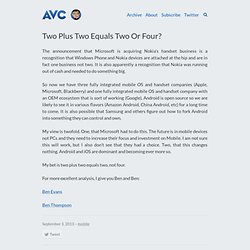
It is also apparently a recognition that Nokia was running out of cash and needed to do something big. So now we have three fully integrated mobile OS and handset companies (Apple, Microsoft, Blackberry) and one fully integrated mobile OS and handset company with an OEM ecosystem that is sort of working (Google). Android is open source so we are likely to see it in various flavors (Amazon Android, China Android, etc) for a long time to come. It is also possible that Samsung and others figure out how to fork Android into something they can control and own.
My view is twofold. My bet is two plus two equals two, not four. For more excellent analysis, I give you Ben and Ben: Ben Evans Ben Thompson. Who’s buying whom? When a prosperous company buys a struggling company you have to wonder what they’re really buying.
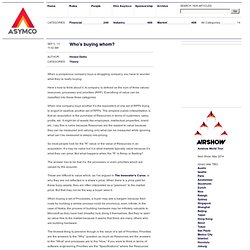
Here’s how to think about it. A company is defined as the sum of three values: resources, processes and priorities (RPP). Everything of value can be classified into these three categories. When one company buys another it’s the equivalent of one set of RPPs trying to engulf or swallow another set of RPPs. The simplest (naïve) interpretation is that an acquisition is the purchase of Resources in terms of customers, sales, profits, etc. So most people look for the “R” value or the value of Resources in an acquisition. The answer has to be that it’s the processes or even priorities which are valued by the acquirer. These are difficult to value which, as I’ve argued in The Innovator’s Curse, is why they are not reflected in a share’s price. When buying a set of Processes, a buyer may see a bargain because their costs for building a similar process could be enormous, even infinite.
Resources? Microsoft and Nokia. It’s been very clear that for some time that Windows Phone was not working.
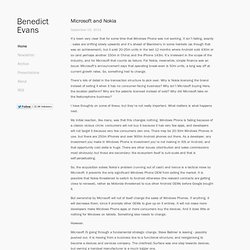
It isn’t failing, exactly - sales are drifting slowly upwards and it’s ahead of Blackberry in some markets (as though that was an achievement), but it sold 20-25m units in the last 12 months where Android sold 430m or so (and perhaps another 150m in China) and the iPhone 143m. It’s irrelevant in the scope of the industry, and for Microsoft that counts as failure.
The Deal That Makes No Sense. Early this morning Microsoft acquired Nokia for €3.79 billion (plus €1.65 billion for patents).
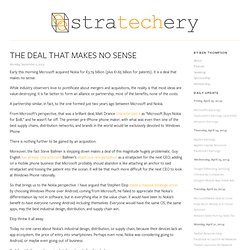
It is a deal that makes no sense. While industry observers love to pontificate about mergers and acquisitions, the reality is that most ideas are value-destroying. It is far better to form an alliance or partnership; most of the benefits, none of the costs. A partnership similar, in fact, to the one formed just two years ago between Microsoft and Nokia. From Microsoft’s perspective, that was a brilliant deal; Matt Drance characterized it as “Microsoft Buys Nokia for $0B,” and he wasn’t far off.
There is nothing further to be gained by an acquisition. Moreover, the fact Steve Ballmer is stepping down makes a deal of this magnitude hugely problematic. So that brings us to the Nokia perspective. Elop threw it all away. Today no one cares about Nokia’s industrial design, distribution, or supply chain, because their devices lack an app ecosystem, the price of entry into smartphones. Another Nokia Explanation; The Same Tragic Conclusion. While I remain convinced that Microsoft’s Nokia acquisition was largely driven by fear of losing Nokia as an OEM, either to Android or bankruptcy, there is something else curious about the timing.
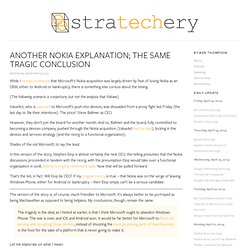
(The following scenario is conjecture, but not the analysis that follows) ValueAct, who is opposed to Microsoft’s push into devices, was dissuaded from a proxy fight last Friday (the last day to file their intentions). The price? Steve Ballmer as CEO. However, they don’t join the board for another month. Shades of the old Microsoft, to say the least. In this version of the story, Stephen Elop is almost certainly the next CEO; this telling presumes that the Nokia discussions proceeded in tandem with the reorg, with the presumption Elop would take over a functional organization in 2018, Ballmer’s original retirement date.
That’s the tell, in fact.